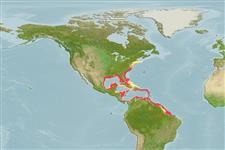Preferred temperature (Ref.
115969): 19.7 - 27.5, mean 24.4 (based on 218 cells).
Phylogenetic diversity index (Ref.
82804): PD
50 = 0.5000 [Uniqueness, from 0.5 = low to 2.0 = high].
Bayesian length-weight: a=0.01445 (0.01280 - 0.01632), b=2.97 (2.95 - 2.99), in cm Total Length, based on LWR estimates for this species (Ref.
93245).
Mức dinh dưỡng (Ref.
69278): 3.9 ±0.72 se; based on food items.
Thích nghi nhanh (Ref.
120179): Trung bình, thời gian nhân đôi của chủng quần tối thiểu là 1.4 - 4.4 năm (K=0.12-0.2; tmax=16; Fec > 1 million).
Prior r = 0.48, 95% CL = 0.31 - 0.71, Based on 2 data-limited stock assessments.
Fishing Vulnerability (Ref.
59153): Moderate to high vulnerability (54 of 100).
Climate Vulnerability (Ref.
125649): Moderate to high vulnerability (51 of 100).
